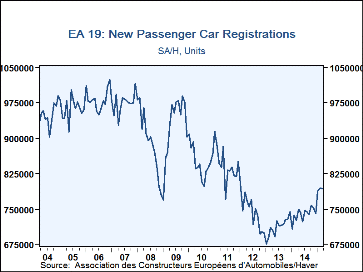 Global| Apr 16 2015
Global| Apr 16 2015European Auto Registrations Rise Again
Summary
European auto registrations popped in January and have continued to build on that strong gain. Monthly registrations are up for four consecutive months. Annual gains are in the 7% to 10% range consistently in 2015 (three months in). [...]
 European auto registrations popped in January and have continued to build on that strong gain. Monthly registrations are up for four consecutive months. Annual gains are in the 7% to 10% range consistently in 2015 (three months in). That is up from a full range of year-over results in 2014 that saw monthly sampled year-over-year gains run from 1.9% to 9%; year-over-year gains averaged 5.5%. Against those metrics 2015 is off to a roaring start.
European auto registrations popped in January and have continued to build on that strong gain. Monthly registrations are up for four consecutive months. Annual gains are in the 7% to 10% range consistently in 2015 (three months in). That is up from a full range of year-over results in 2014 that saw monthly sampled year-over-year gains run from 1.9% to 9%; year-over-year gains averaged 5.5%. Against those metrics 2015 is off to a roaring start.
Over three months registrations in Spain are up at a 117% annual rate, leading the group. The U.K. has registrations falling over that horizon. Both Spain and Italy saw sales spurt in January and both are showing a pronounced slowing in sales after that spurt. But the overall monthly sales gains in March and February at 1.3% and 0.6%, respectively, are still above the average monthly gain for last year which was 0.2%. So the slowdown is leaving good growth metrics in the wake of the January surge. Germany, despite the weaker euro and the brightening outlook there, has registrations lower month-to-month for two months running. At a 9.8% pace, Germany has the weakest three-month gain among EMU members in the table but it still probably has the brightest outlook.
Registrations are accelerating for the EU as a whole, for Germany, France, Italy, and Spain from 12 months to six months to three months. The U.K. breaks this pattern with a decline in registrations over three months.
The 7.3% year-over-year gain in March is the largest gain in March since 2010 when registrations rose by 7.5%. The 2010 gain has been helped by an easy comparison with the year before when registrations were lower by 15.1% year-over-year in March. Apart from that, there are no comparable gains in registrations in March back to 2003. In the last 135 months as whole year-over-year registrations have been stronger only 13 times.
Europe has been on an upswing buoyed by the ECB's new QE plan and by the weaker euro which is substantially a result of that program. Just today the four German institutes raised their outlook for German growth in the year ahead to 2.1% from 1.3% previously. Also, the professional forecasters canvassed in the ECB's survey of Professional Forecasters finds a lower inflation outlook and an improved growth outlook. Just yesterday ECB President Mario Draghi was telling us how well QE is working. Europe is on an upswing.
Big-ticket sales like those indicated by improved auto registrations are a good sign for growth ahead. The improved sales in early 2015 are simply another sign that Europe is digging itself out of its morass as the ECB steps on the gas to assure a continued evolution of the expansion. The one remaining fly in the ointment is Greece. Greece has been downgraded by S&P today as that agency sees Greece's commitments as unsustainable. A Grexist is something that could still disturb Europe's apple cart. But for now growth projections, monetary policy and robust auto registrations seem to be pointing in the right direction.

Robert Brusca
AuthorMore in Author Profile »Robert A. Brusca is Chief Economist of Fact and Opinion Economics, a consulting firm he founded in Manhattan. He has been an economist on Wall Street for over 25 years. He has visited central banking and large institutional clients in over 30 countries in his career as an economist. Mr. Brusca was a Divisional Research Chief at the Federal Reserve Bank of NY (Chief of the International Financial markets Division), a Fed Watcher at Irving Trust and Chief Economist at Nikko Securities International. He is widely quoted and appears in various media. Mr. Brusca holds an MA and Ph.D. in economics from Michigan State University and a BA in Economics from the University of Michigan. His research pursues his strong interests in non aligned policy economics as well as international economics. FAO Economics’ research targets investors to assist them in making better investment decisions in stocks, bonds and in a variety of international assets. The company does not manage money and has no conflicts in giving economic advice.
More Economy in Brief
 Global| Feb 05 2026
Global| Feb 05 2026Charts of the Week: Balanced Policy, Resilient Data and AI Narratives
by:Andrew Cates






